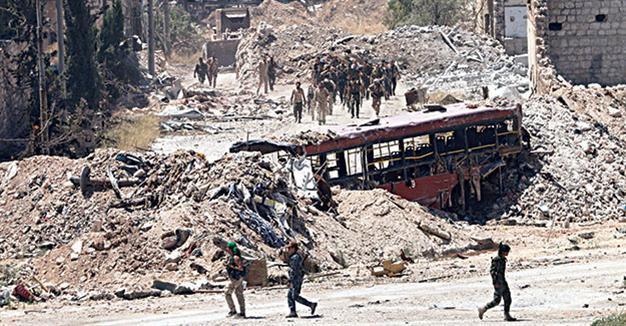US seeks opportunity to attack ISIL from south
WASHINGTON

Syrian army soldiers patrol the area around the entrance of Bani Zeid after taking control of the previously rebel-held district of Leramun, on the northwest outskirts of Aleppo, on July 28, 2016. AFP photo
The U.S.-led coalition fighting the Islamic State of Iraq and the Levant (ISIL) aims to open a new front in southern Syria against ISIL in addition to its ongoing offensive in the northeast, U.S. Defense Secretary Ashton Carter said July 27.
“We will aggressively pursue opportunities to build pressure on ISIL in Syria from the south, complementing our existing, robust efforts from northeastern Syria,” he was quoted as saying by AFP in a speech to U.S. troops.
Carter said the move would help Jordanian security and further split ISIL theaters of operation in Syria and Iraq.
At the moment, the main coalition effort is centered on recapturing the Manbij pocket in northern Syria, the last jihadist-held territory bordering Turkey.
Meanwhile, Syria ally Russia announced a “large-scale” aid operation July 28 for trapped civilians and opposition fighters fleeing the embattled northern city of Aleppo, as Syrian President Bashar al-Assad offered an amnesty to rebels who surrender.
Pro-government forces effectively surround opposition neighborhoods of the divided city, sparking fears for at least 200,000 people trapped there.
Russian Defense Minister Sergei Shoigu told reporters that three humanitarian corridors were being opened “to aid civilians held hostage by terrorists and for fighters wishing to lay down their arms” and one more corridor to the north of the city for rebels to flee with their weapons.
Medical posts and food handouts would be provided along the routes intended for civilians and fighters who surrender, Shoigu said.
In a parallel move, al-Assad on the same day issued a rare presidential decree offering amnesty to armed rebels who give themselves up in the next three months, the official SANA news agency reported.
“Everyone carrying arms... and sought by justice... is excluded from full punishment if they hand themselves in and lay down their weapons,” SANA said, adding the reprieve would also include any rebel who freed a hostage.
State television announced “the opening of three passages to allow citizens out of eastern districts” of Aleppo, adding that “everything was ready to receive them in temporary installations.”
But an AFP correspondent who went to see one of the corridors said that it remained closed and saw no movement of residents nearby. Regime planes on July 28 dropped flyers showing a map with the location of these humanitarian passages, he said.
Hours after Russia and Syria’s moves, U.N. Syria envoy Staffan de Mistura called on Russia and the United States to work together in reducing the fighting in Syria, saying that the failure of their cooperation plan would have a very negative impact on planned peace talks.
“We are all awaiting and urging the two co-chairs – which means Russia and the U.S. – to expedite their own discussions on how to reduce violence,” de Mistura said, according to Reuters.
“I understand that there are several experts from the military establishment from both Russia and perhaps from the U.S. on their way to Geneva and probably, most likely, in order to discuss the so-called ‘devil in the details’ which are the ones we have been asking to be sorted out as soon as possible,” he said.
Shoigu said on July 28 that Moscow was sending a top general and experts to Geneva at the request of U.S. Secretary of State John Kerry to discuss the crisis surrounding Aleppo, the Associated Press reported.
Meanwhile, the international anti-ISIL coalition has opened a formal investigation to determine whether its air strikes last week near the Syrian city of Manbij claimed civilian lives, spokesman Col. Chris Garver said July 27.
After examining “internal and external information,” the coalition determined that there was sufficient credible evidence of civilian victims to open a formal inquiry, said Garver.
The Britain-based Syrian Observatory for Human Rights said at least 56 civilians, including 11 children, died as they fled from a village near Manbij, a strategic waypoint between Turkey and the jihadist stronghold of Raqqa.
